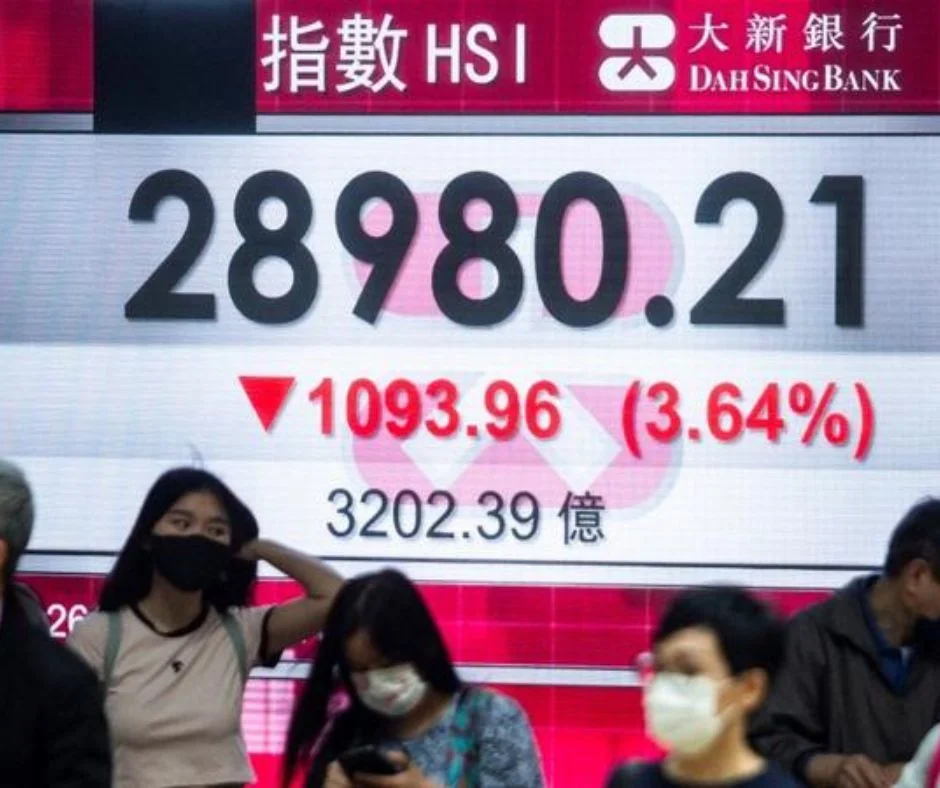Hong Kong’s market is down! What's happening?
Chinese markets are in trouble as the Hang Seng, Hong Kong’s stock index, has lost 26% in less than 11 months!!
2023 was off to a great start for China. The Hang Seng, which had hit its lowest levels in 13 years, was making a fiery recovery in the final quarter of 2022! China was easing its brutal Covid restrictions which boosted investor sentiment, resulting in a buying spree. Moreover, the momentum was carrying on in early 2023 as the index gained over 10% in January itself!
The index peaked around the end of January 2023 when it reached its highest level in almost 10 months after which it saw some correction. Analysts were bullish on the market where valuations were at a decadal low and the market seemed attractive to invest in. Inflows into Chinese equity and debt soared as the re-emergence of the Chinese economy gave a sense of optimism to investors.
February brought about a decline in the market as global cues looked negative. Vladimir Putin’s nuclear rhetoric threatened a larger conflict, thereby spooking investors. Moreover, US inflation was higher than anticipated which prompted the US Fed to hike interest rates by 25 bps, thereby tanking indices globally.
The Hang Seng fell 9.7% in February as the decline in February marked the worst decline faced by the index in decades! Geopolitical tensions undermined investors’ risk appetite as Alibaba and auto stocks like BYD and Geely Auto led the market in decline. Moreover, investors were looking closely at China’s economic data to determine the economic growth and any policy plans to boost the economy.
China released healthy key economic data as factory activity hit its highest level since 2012, leading to the Hang Seng surging over 4% in a single day! The index consolidated over the week as healthier economic data fueled positive sentiments for the economy. However, the US Fed could not control inflation as it hiked interest rates once again
Another 25 bps hike crushed investor sentiment and tanked the Hang Seng as it fell 2-3% for several days. By the third week of March 2023, multiple US banks had failed as it further soured investment prospects and ended up wiping all the index’s gains it registered since November 2022. Moreover, concerns about tech import restrictions from countries like the Netherlands hampered the future outlook for Tech stocks, resulting in a tech stocks sell-off.
The index recovered by the end of March as it reclaimed its key level at 20,253 as the index’s movement remained range-bound for most of April while registering some correction. When May arrived, the index continued to trade around its resistance but saw a meltdown as the Fed raised interest rates by 25 bps once again.
China’s real estate sector began showing cracks as foreign investors began pulling out of Chinese companies amid China’s crackdown on billionaires and the establishment of the Central Finance Commission which was cracking down on Chinese billionaires like Jack Ma and Bao Fan.
The index managed to avoid major losses during the first half of May, but the second half brought about a complete meltdown as the index tanked to its lowest levels in 6 months! Poor performance of the property sector and the cooling healthcare sector led the decline as the index lost over 8% in a month.
June brought about a sharp reversal at the lower levels as a government stimulus to boost the markets fueled optimism and sent markets soaring to the 20,000 levels within 2 weeks! However, bulls could not sustain the index at said level as it was range-bound until August 2023.
By the end of July 2023, the index had retested its support at 20,253 and failed to breach it as it declined to comply with the range. However, the country’s weakening real estate sector, low foreign investment, and lower consumer demand weighed on the overall economic growth as the Evergrande Group announced bankruptcy!
The index breached its support at 18,527 as the index lost 12% in 3 weeks! The markets recovered from 17,600 as the Chinese government announced several measures like lower stamp duty on trades and lower IPOs which helped the stock briefly go back up its resistance at 18,527 before falling through it once again in September.
EXIM slowed down, the property sector’s worries worsened (even though the government announced plans to support it), and the US announced its plans to hike rates further as the Hang Seng continued its losing spree and fell 4%. In early October, the index took support at 17,103, which was a historically important level.
Valuations looked cheaper with some counters showing an upside of as high as 27% and buybacks surged, prompting bulls to take charge once again, even as the property sector looked weak. However, mid-way through October, China’s economic data showed a greater slowdown in consumer prices, causing investors to worry about the country’s economic health. Moreover, Country Garden became the second major property developer that defaulted on its debt, sending shares tumbling down, but maintaining above its support at 17,103.
Hedge funds turned net sellers as Chinese stocks were dumped and the Hang Seng index kept declining as it briefly breached the 16,000 level and tested another critically important support at 16,206.58. Local brokerages began closing shop as the number of IPOs tanked and the Hong Kong stock market was surpassed by India’s as the seventh largest globally.
The index continued trading along its support at 16,206.58, but a favourable US inflation report, new housing stimulus policies, and the Fed’s plan to trim interest rates boosted investor sentiments globally as the index jumped over 3% in 2 sessions followed by some corrections.
What’s the future outlook??
Technically, the index last closed above its 5 and 20-day average, but well below its 50, 100, and 200-day averages. The index spiked in the last trading session as it climbed over 2.5% and breached the steeper trend line (TL1) in a single day to inch toward its immediate resistance at 17,103.
The Santa Claus rally and year-end positivity over rate cuts are driving global markets up. Moreover, FIIs have taken interest in Chinese equities once again which are currently at multi-year lows, thereby making them attractive investment opportunities. However, the outlook remains grim.
Fundamentally, the prospects of the index look bleak.
- Macroeconomic conditions are poor in China as Moody’s recently downgraded the country’s bonds from ‘Stable’ to ‘Negative’. The World Bank has also trimmed down growth forecasts for the economy.
- Industrial profits and production in China have seen slow growth. Retail spending saw a surprising jump of 10.1% in November, which was a sign of hope that the sluggish consumer spending was improving. However, it is not clear whether the same can be sustained.
- Real estate, which accounts for a quarter of the economy, has received 18% less investment as sales have been rapidly declining. Although the People’s Bank of China (PBOC) recently announced a $112 billion to boost economic growth and relaxed property purchase norms, analysts feel these moves may not be enough to revive the sector.
- The geopolitical landscape is worsening as well. The Israel-Hamas war is not ceasing, the Ukraine-Russia conflict could incorporate bigger weapons, and China is openly provoking the Phillippines and Taiwan. Any further escalations, although highly unlikely, could dampen global investing sentiments.
- Experts feel the Hang Seng could witness the repercussions of the years of decline in activity. The index is currently at an average loss of 11% in the past 4 years while other markets are showing signs of recovery. Investors are expected to seek out companies with a global reach or similar insulation to secure their investment in the country. As such, companies with greater domestic business and sectors like hospitals, retail, and real estate are expected to be ignored by most investors while medical innovators with a global edge and EVs are expected to be the top investment prospects for foreign investors.
- Retail investors are turning their back on mutual funds as the worth of new portfolios, around $21 billion, issued this year have hit a decadal low!! Moreover, the trading volume in the index declined by 20% in October 2023 after falling 10% in September 2023, further showing the challenges faced by the index amid cautious investor sentiments.
Although the real estate sector is suffering, the stocks are currently undervalued. 16,000 continues to be a strong support for the index as it could take support and rebound to its immediate resistance, but it may not be able to breach the broader trend line (TL2). Thus, the index may see some favourable move in the near term, but there appears no end to the downtrend for now.










 1,499
1,499
